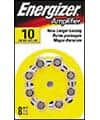New Courtroom Tool for Interpreters for Deaf/Hard of Hearing
September 18, 2007
The Supreme Court of Ohio has released a new reference tool for judges throughout Ohio to assist them in working with interpreters for deaf or hard of hearing persons in the courtroom.
The interpreter bench cards were developed to support judicial officers in determining if an interpreter is needed for a litigant, party, or witness and identifying if an interpreter is qualified. The Ohio-specific guide is intended to serve as a tool to inform courtroom practice.
“The objective is to have court services accessible to all including deaf and hard of hearing individuals,” says Bruno Romero, manager of the Supreme Court’s Interpreter Services Program. “Even though it is a small minority within the populations that need interpretive services in the courts, it is still an important population to serve.”
The bench card walks judicial officers through a series of questions to determine the communication preference of the deaf or hard of hearing party. It also assists the officer with judging whether an interpreter is qualified and encourages that a certified interpreter be used. The card provides the language of the oath to be given to the interpreter and guidance as to how to facilitate communication in an interpreted proceeding. The card also provides the judge with suggested language to explain to the defendant/witness, the courtroom and the jury the role of the interpreter.
The bench cards offered by the Supreme Court are in addition to other services, such as training for judges, the Court provides to better equip judges to work with interpreters and deaf or hard of hearing litigants, witnesses and other parties. Approximately 1,400 interpretations involving deaf or hard of hearing individuals are performed in Ohio courts each year. To view the “Working with Interpreters for Deaf or Hard of Hearing Persons in the Courtroom” bench card, click here.
SOURCE: www.supremecourtofohio.gov


